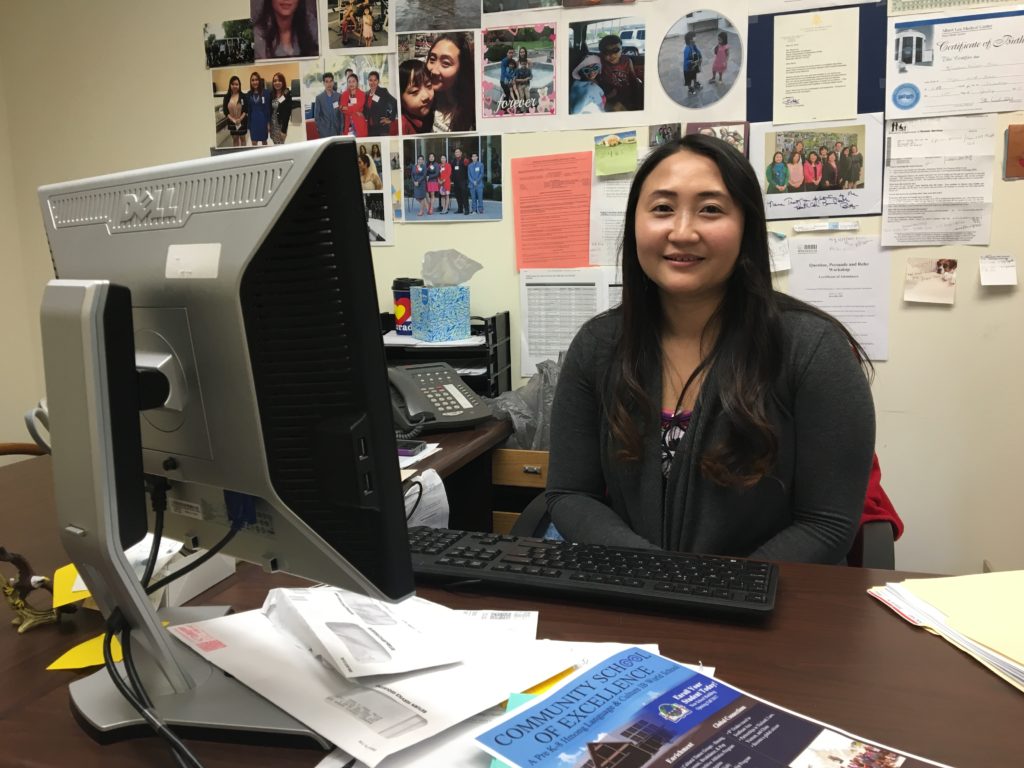
Nana Loo is KOM’s Family Advocate who works with men, women, and children experiencing family problems.
*Paw Eh had been coming to KOM for years to get help reading mail and filling out public assistance forms, but this time she was here for something different. Her wrist was broken and she asked to meet with KOM’s Family Advocate, Nana Loo.
When Loo sat down with her, Paw Eh shared that she had gotten into an argument with her husband and he hit her.
“I was weak and couldn’t fight back,” said Paw Eh. “I came to KOM because I knew I could get help.”
Paw Eh told Nana that she did not feel safe living with her husband anymore and wanted to move out. As a victim of domestic violence, Loo brought her to a county service to file an Order for Protection.
In 2016, Nana had 68 cases that mostly involved domestic violence. She also works with divorce and child protection cases. As KOM’s Family Advocate, her role is to provide resources and support to refugees from Burma who are facing family problems.
Nana has been KOM’s Family Advocate since August 2015. She studied human services at Rasmussen College, which was her introduction to social work and case management. She accepted the position as a Family Advocate at KOM because she wanted to learn more about helping her community with family problems.
“Refugees from Burma don’t know how to access resources to receive help for family problems,” said Nana.
She explained that in Burma and the refugee camps in Thailand, there is no legal process that the wife and husband need to go through to separate from each other. This is why the process can be confusing or difficult for refugees from Burma in the U.S.
When a client meets with Nana, she does an intake assessment to learn about the situation. Based on their response, she refers clients to the appropriate services.
“If a woman is experiencing domestic violence and doesn’t feel safe to go home, I call Asian Women United of Minnesota (AWUM) or Tubman to check availability for their shelters,” said Nana.
AWUM and Tubman are both nonprofits that provide women and children who are victims of domestic violence with shelter and support services. Nana has a good relationship with them, and often sends clients to live there for up to 90 days.
Nana also refers clients to Bridges to Safety, a domestic abuse service center in St. Paul. Nana takes clients there to file Orders for Protection (OFP). Upon filing the OFP, the husband and wife are scheduled for a court hearing. If the judge signs it, the client can call the police at any time if their abuser comes near them.
After meeting with Nana and being directed to the appropriate service, clients often move in with family members or friends. However, Nana said that about 15% of her clients stay living at home with their abuser.
“Some women are afraid of their husbands,” said Nana. “If she files an OFP or moves to a shelter, then she fears her husband will get angry. So she forgives him and stays at home, even if there is a risk of the abuse starting again.”
Loo also reported that women who have children and file an OFP must complete a child support form for their public assistance to continue. However, many of her clients hesitate to fill out the form.
“In Karen culture, women don’t want to receive support from their husband if they separate,” said Nana. “Women feel shame if they ask for the support of the husband.”
Loo shared that there are many cultural norms that social workers, case managers, and others working with victims of domestic violence must keep in mind when serving Karen clients.
“Our culture is different from American culture,” said Nana. “For every case, a Karen case worker should be consulted to ensure there is no cultural misunderstanding.”
In the two years that Nana has worked as the Family Advocate, she has seen a wide variety of cases. Right now most of her new cases involve divorce, but she also continues to meet with former clients for ongoing needs.
“I feel like my job is stressful, but the more I do it the more I learn how to handle each case,” said Nana.
*Name changed for confidentiality of the client.
Helpful contacts for Karen culturally-specific family crisis services in St. Paul, MN:
- Nana Loo, Family Advocate at KOM, 651-202-3123,
mloo@mnkaren.org - Kyi Kyi Htway, Karen Family Advocate at HAP, 651-495-1589,
kyikyih@hmong.org - George Thaw Moo, Child Protection Worker at Ramsey County Community Human Services, 651-266-7790,
george.thawmoo@co.ramsey.mn.us
Learn more about KOM’s Family Advocate program.


 (651)788-7593
(651)788-7593


